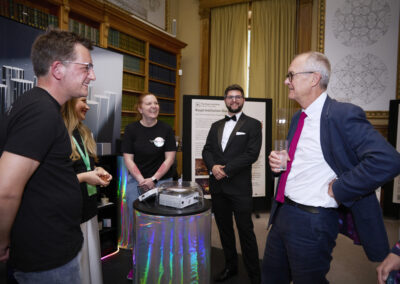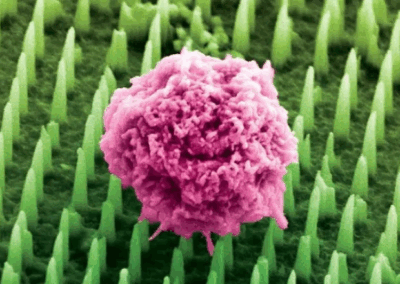New UCL led Digital Health Hub for Antimicrobial Resistance (AMR) awarded £4M as part of Engineering and Physical Sciences Research Council (EPSRC) investment
The Digital Health Hub for AMR aims to harness innovative digital technologies to ultimately transform antimicrobial one-health surveillance and antimicrobial stewardship, recognising the interconnectedness of AMR between humans, animals and the environment.
This Award is part of a large EPSRC investment plan of £16.5 million to create new digital healthcare hubs across England to promote knowledge and skills sharing across a range of partners including the NHS, social care providers, universities and businesses.
The Digital Health Hub for AMR – led by Professor McKendry from the London Centre for Nanotechnology and Division of Medicine UCL – will bring together a critical mass of researchers working across traditional disciplines for AMR, including computer science, data visualisation, biomedical engineering, behavioural science, environmental science, clinical and public health research, along with the NHS, UK Health Security Agency (UKHSA), Centre for Ecology and Hydrology (UK CEH), charities and industry partners. The Hub aims to bring together diverse stakeholders, upskill 100+ researchers to become future leaders as well as Grand Challenge R&D exemplars and a flexible funding programme to seed new collaborations.
The UCL co-investigators are based across various disciplines including Prof Laura Shallcross (Institute of Health Informatics), Prof Ingemar Cox (Department of Computer Science), Prof James Hetherington (Advanced Research Computing), Dr Fabiana Lorencatto (Centre for Behaviour Change), Prof Bill Lampos (Department of Computer Science), Dr Jo Gibbs (Institute for Global Health), Prof Steven Gray (Centre for Advanced Spatial Analysis), and Prof Eleni Nastouli (UCL GOS Institute of Child Health; UCL Hospital).
Antimicrobial resistance (AMR) refers to when microorganisms (such as bacteria) change over time and no longer respond to medicines, making infections harder to treat. Antimicrobials underpin modern medicine, and play a vital role in treating infectious diseases and prevention. However due to AMR, microorganisms that once were treatable with front-line antimicrobials are becoming more difficult to treat, risking disease spread, prolonged severe illness and death. Of particular concern is the rapid global spread of multi- and pan-resistant bacteria (‘superbugs’) which cause infections that are not treatable.
Professor Rachel McKendry (Lead Investigator and Hub Director) at UCL says, “Antimicrobial resistance ranks among the top 10 global public health threat facing humanity, and has been called the ‘silent pandemic’. Our EPSRC digital health hub will bringing together a brilliant team of interdisciplinary researchers to explore the enormous potential of digital health for one-health AMR, and currently siloed data sets spanning humans, animals and the environment.”
Professor David Jones (Co-Investigator & Deputy Director) at Bangor University comments, “At the moment, the antimicrobial resistance picture is still quite fragmented. This Digital Health Hub will bring together datasets and the stakeholder community to produce new and integrated solutions to help tackle the rise of antimicrobial resistance.”
Professor Laura Shallcross (Co-Investigator & Deputy Director) at UCL, says, “Antimicrobial resistance causes more deaths worldwide than HIV and malaria. This project represents a fantastic opportunity to bring scientists, industry experts, health and social care workers and policymakers together to tackle this global public health priority by harnessing the potential of data and digital technologies.”
The EPSRC are funding 5 digital health hubs in total, including the AMR Digital Health Hub, to drive the development of innovative digital technologies for healthcare. There are five key healthcare challenge focuses:
- Digital Health Hub for Antimicrobial resistance, led by Professor Rachel McKendry, UCL
- The South Yorkshire Digital Health Hub, Professor Tim Chico, The University of Sheffield
- Northern Health Futures (NortHFutures) Hub, Professor Abigail Durrant, Newcastle University
- King’s Health Partner (KHP) Digital Health Hub Professor Sebastien Ourselin, King’s College London
- The Leadership Engagement Acceleration and Partnership (LEAP) Digital Health Hub Partnership, Ian Craddock, Bristol.



